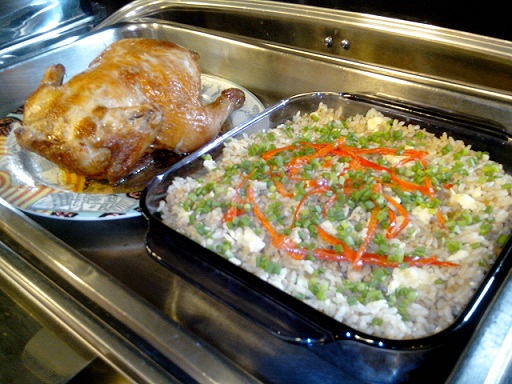By MELISSA LUZ LOPEZ
INSTEAD of feasting on the usual lechon – known to be the staple of a Filipino fiesta, health advocates urged people to shift to a tastier and more nutritious alternative: an organic brown rice meal.
This they did with the help of some celebrities, who gave a sampling of their unique brown rice dishes during the recent World Food Day celebration at the PETA Theater Center in Quezon City.
Comedienne Tuesday Vargas, who prepared a sumptuous brown rice and garlic lime chicken dish for the event, said: “As a testament, lahat po kami ay gumawa ng mga pagkain na bukod sa masustansya na at mabuti para sa ating mga local farmers, ang mga ito po ay masarap (all of us prepared meals that are not only nutritious and beneficial to local farmers, but also taste good).”
Imago vocalist Aia De Leon whipped up a three-layer brown rice special, made of chicken, squash and mozzarella cheese, while singer and cyclist Nityalila Saulo warmed the crowd’s presence with her brewed brown rice coffee. Singer Bayang Barrios came with her very own fried brown rice and pinaupong manok.
Showing there was more to brown rice than simply being a main course item, chef Kenny Joe Tallado prepared three unique flavors of brown rice ice cream: brown rice with malunggay, siling labuyo and dark chocolate, and langka.
“There’s always something within our own territory that allows us to create great-tasting food,” said Chef Tatung Sarthou, who shared with the audience his recipe for coconut chicken with brown rice.
Sarthou traced his roots in Cebu where, he said, eating brown rice was the norm. He noted that brown rice was no doubt better for the body than white rice.
Singer-composer and Dakila vice-president Noel Cabangon, singer Dong Abay, and actors Mikael Daez, Ronnie Lazaro, Roxanne Barcelo and Will Devaughn also graced the event.
“We want to make brown rice mainstream,” Daez, an Oxfam Philippines ambassador, said.
Dakila artist collective and Oxfam Philippines launched in 2011 the ‘Good Food Project,’ which promotes the shift to brown rice. Now on its second year, organizers continue to promote the campaign by hosting events across the metro.
Brown rice is no different from the staple white rice, except that it went through only one milling process – thus, the color. By doing so, the bran layer is kept intact, along with vitamins and minerals that help maintain the body in good shape.
Compared to white rice, brown rice is loaded with more fiber, which improves digestion and increases antioxidants in the body. It also has lower sugar content, making it a better alternative for diabetics and for the figure-conscious. Nutrients found in brown rice also help maintain low cholesterol levels and lessen the risk for heart disease.
Beyond its nutty flavor and rough texture, the shift to brown rice would also benefit local farmers, according to Shubert Ciencia of the Kooperatibang Likas ng Nueva Ecija (KOOL-NE) — a cooperative that has been planting organic brown rice since 1993.
Ciencia said brown rice has a 10 percent greater yield and a higher recovery rate than white rice. He added that organic brown rice is cheaper to produce, as it requires shorter milling time and lower production costs.
However, the price of brown rice remains higher than that of white rice. In Metro Manila, a kilo of brown rice costs between P55 to P90— more than enough to buy a kilo of class-A dinorado white rice. The cheapest brown rice sells for P42 per kilo in North Cotabato. On the other hand, the average price of white rice is only about P39 a kilo.
Dakila campaign coordinator Rash Caritativo said if Filipinos would make the shift, the big demand would eventually pull prices down, making brown rice accessible to the masses.
“Kung ikaw mismo, alam mo sa sarili mo na (if you yourself know that) you could really afford this (brown rice), more than the health benefits, you [would consider the shift because you] could also help fellow Filipinos and local small-scale farmers,” she said.
Aside from local celebrities, the brown rice campaign should also gain the support of policymakers to ensure its long-run success, said Marie Nunez, program coordinator of Oxfam Philippines.
“We need the private sector and government to invest more in organic and sustainable farming to help small producers,” she said.
